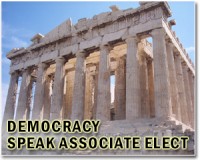 |
Bangkok (AFP) May 1, 2011 With elections looming, Thailand's army is putting on a show of strength that has added to uncertainty about whether the vote will actually go ahead in the politically divided nation, experts say. Thai Prime Minister Abhisit Vejjajiva, who is shortly expected to call an election to be held by early July, has insisted that a deadly border conflict between the Thai and Cambodian armies will not derail the poll. But experts say the fighting could play into the hands of Thailand's military-backed elites who want to prevent the political allies of fugitive ex-premier Thaksin Shinawatra taking power. Some fear the border clashes could even be used as a reason to put off the parliamentary polls. "There is an undercurrent of attempts to create a crisis that could be used for delaying, or delaying permanently, an election," said Thailand-based scholar and author Chris Baker. "The army is more and more out of control and beholden to itself and itself alone." Bangkok and Phnom Penh have blamed each other for starting the fighting, which has left at least 16 people dead and has caused tens of thousands of civilians to flee their homes. Regardless of the exact origin of the latest clashes, some observers believe the conflict could boost support for Abhisit's Democrat Party, while also increasing the influence of the military. The dispute "gives the military an excellent opportunity to remain in the political limelight," said Pavin Chachavalpongpun, a Thailand expert at the Institute of Southeast Asian Studies in Singapore. "It will be a win-win situation for the military and the government, because in this crisis they will show patriotism. The military has no intention to leave politics," he said. Thailand remains deeply divided a year after opposition rallies by the "Red Shirt" movement, demanding snap elections, sparked violence which left more than 90 people dead in clashes between protesters and armed troops in Bangkok. Many of the mainly rural, working class Reds are loyal to Thaksin, who was ousted as prime minister in a 2006 military coup. The former telecoms tycoon lives in self-imposed exile overseas but is considered the de facto leader of the opposition Puea Thai party. Thailand's army chief General Prayut Chan-O-Cha, a staunch royalist and critic of the Red Shirts, has pledged to abide by the results of what is expected to be a closely fought election. But that has not dampened speculation about possible military intervention in a country that has seen 18 actual or attempted coups since 1932, when it became a constitutional monarchy. "If the Democrats cannot cobble together a post-election coalition, technicalities to prevent Thaksin's Puea Thai from taking power are likely, including the potential of an outright military coup as last resort," said Thai political expert Thitinan Pongsudhirak. The Reds view Abhisit's government as undemocratic because it came to power in a 2008 parliamentary vote with army backing, after a court ruling threw out the previous elected administration. Thaksin is hailed by the Reds for his policies for the masses while in power, but he is seen by the ruling elite as corrupt and a threat to the revered monarchy. Some top Red Shirts have also been accused of disloyalty to the crown. On the instructions of its commander-in-chief, the military last month filed a complaint against three "Red Shirt" leaders for allegedly insulting the monarchy during rally speeches -- a serious charge in Thailand. In remarks that appeared to be aimed mainly at the Red Shirt leaders, General Prayut later warned political figures to keep the royals out of the election debate, saying the army "will do its duty to protect the monarchy". Thaksin, who lives abroad to avoid a jail term imposed in absentia for graft, has urged his many followers to vote for Puea Thai, and experts say Abhisit's party faces a tough poll battle. "If it takes place, the election will be a huge gamble for Abhisit" and his political allies, said Thitinan, a visiting professor at Johns Hopkins School of Advanced International Studies in Washington. "They seem on top but may actually have their backs against the wall."
Share This Article With Planet Earth
Related Links Democracy in the 21st century at TerraDaily.com
 Berlin braces for May Day protests
Berlin braces for May Day protestsBerlin (UPI) Apr 29, 2011 Berlin security authorities are gearing up for May 1, a traditional day of sometimes violent protests in Germany's capital. While Britain's biggest security operation in decades Friday was hailed a great success - police in London said they made 43 arrests amid an otherwise joyful crowd of 1 million that watched the royal wedding - officials in Berlin were getting ready to brace for s ... read more |
|
| The content herein, unless otherwise known to be public domain, are Copyright 1995-2010 - SpaceDaily. AFP and UPI Wire Stories are copyright Agence France-Presse and United Press International. ESA Portal Reports are copyright European Space Agency. All NASA sourced material is public domain. Additional copyrights may apply in whole or part to other bona fide parties. Advertising does not imply endorsement,agreement or approval of any opinions, statements or information provided by SpaceDaily on any Web page published or hosted by SpaceDaily. Privacy Statement |